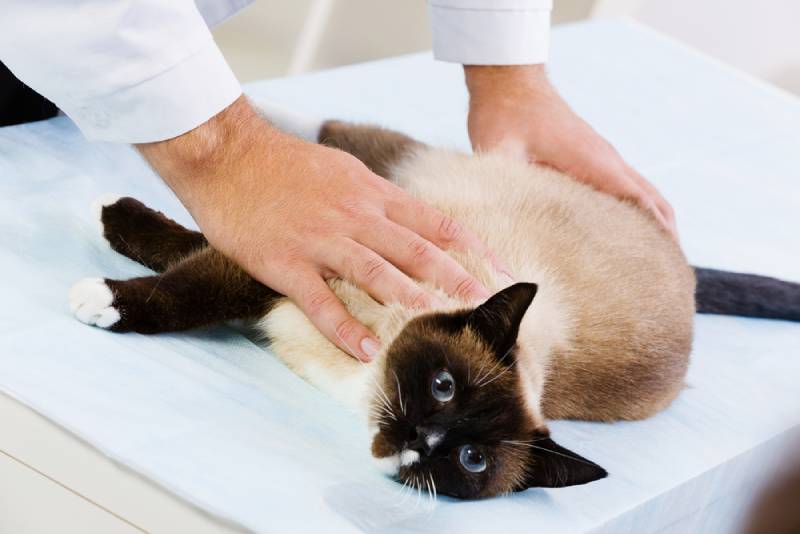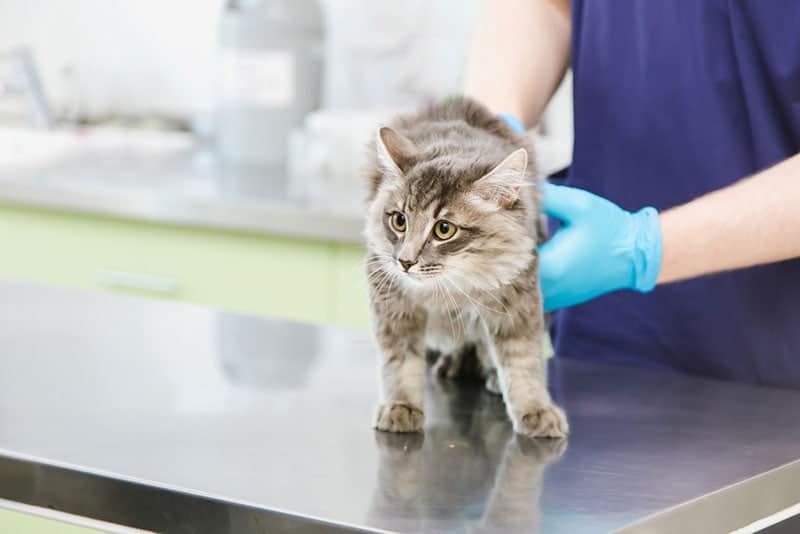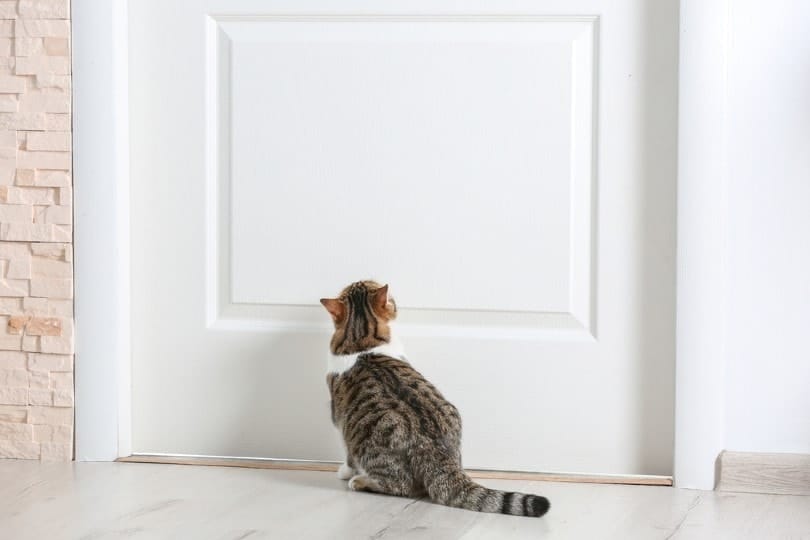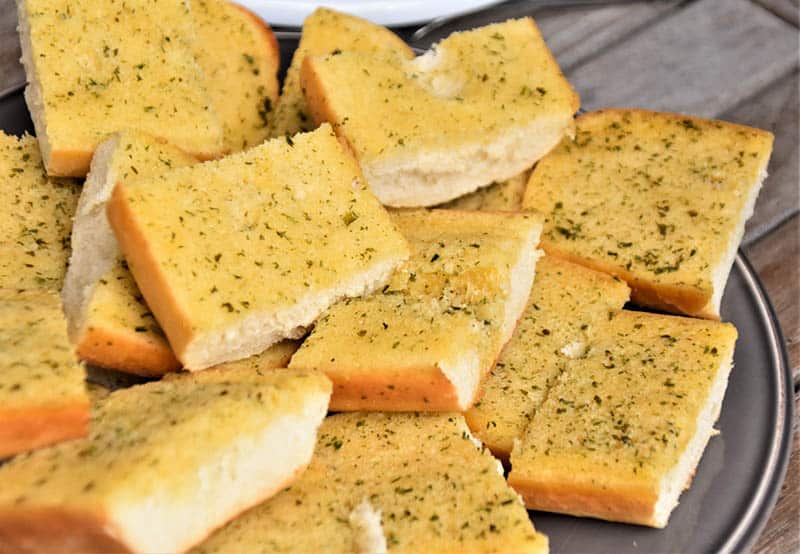Garlic, while responsible for making so much of our food taste delicious, is highly toxic to cats. What should you do if your cat has eaten some garlic bread? Garlic and other allium vegetables such as onions, leeks, chives, and shallots, are poisonous to cats. Depending on the amount ingested, symptoms can appear in a matter of hours or a few days. If a small amount is ingested it can cause anemia, larger amounts can cause complete organ failure and result in death.
If you think your cat might have eaten garlic bread in any form, firstly remove any of the remaining food so they do not have access to it and can’t consume any more. Next, you need to take them to your vet immediately—fast action is required in this scenario. Your vet will be able to induce vomiting to start to attempt to remove any garlic from your cat’s body. This can only be done within a certain time frame, so you need to get them there as soon as possible.

My Cat Ate Garlic Bread, What Do I Do?
1. Prevent them from eating anymore
Ensure the remainder of the garlic bread is removed and your cat does not have access to it any longer.
2. Call your vet immediately
Call your vet to tell them what has happened. Try to include as much information as possible. Your vet may ask you questions such as:
- How much garlic bread did your cat eat?
- How long ago was the garlic bread eaten?
- How much does your cat weigh/what breed are they?
- Is your cat showing any signs of illness?
- Does your cat have any current health issues?

3. Take your cat to the vet as soon as possible
Your vet will advise that you attend the hospital as soon as physically possible. Do not try to induce vomiting at home. Travel to your vets as quickly and safely as possible. Supervise your cat at all times and do not leave them on their own.
You can also call the Pet Poison Helpline or the ASPCA Animal Poison Control Centre. They will be able to give you advice on the ingestion of poisonous substances for your cat. They are an extremely useful resource however it is always recommended to contact your vet initially. These poison helplines will offer sound advice but they cannot treat your cat.

What Are the Dangers of Cats Eating Garlic Bread?
All forms of garlic, raw or cooked, are toxic to your cat. Your cat should never be allowed to eat any form of garlic including cloves of garlic, dried garlic or garlic salt, minced garlic, frozen garlic, or any ready-made food products that have garlic in the ingredients. Garlic contains a substance called sodium n-propyl thiosulfate. This is a toxic compound that causes damage to your cat’s red blood cells, making them rupture.
This can lead to hemolytic anemia which is a life-threatening condition. If left to progress untreated, your cat’s organs will be deprived of oxygen, and this eventually results in organ failure and death.

What Are the Signs of Garlic Toxicity in Cats?
Symptoms of garlic toxicity in cats can vary depending on how much garlic was ingested, how concentrated the garlic was, and your cat’s individual tolerance to toxins. Symptoms can appear rapidly within an hour, or up to 4 days post-exposure.
- Reduced appetite
- Lethargy
- Fatigue
- Vomiting
- Diarrhea
- Breathing difficulty
- Increased breathing rate
- Increased heart rate
- Red or brown urine
- Pale gums
- Collapse
Even if you did not see your cat eat any garlic bread but they have potentially had access to it and they show any of these symptoms, call your vet immediately.

What Are the Causes of Garlic Toxicity in Cats?
Garlic toxicity is caused by the ingestion of any product containing garlic. The amount of garlic that is required to poison your cat varies depending on your cat’s general health status, size, and breed. Usually, as little as one clove of garlic can be enough to poison your cat. Dogs are susceptible to garlic poisoning as well, but not as much as cats.
What Will Your Vet Do?
When you arrive at your vet’s, they will take a full history to determine exactly what has happened. Diagnosis of garlic toxicity is made from clinical signs, history, and examination of a blood sample from your cat under the microscope. Visible changes are witnessed microscopically when sodium n-propyl thiosulfate (the toxic compound in garlic) causes structural damage to the walls of the red blood cells.
Your vet should be able to identify Heinz bodies under the microscope which indicates hemolytic anemia has occurred. The diagnosis is made based on the presence of these Heinz bodies and clinical history. There are other causes as well as garlic toxicity where Heinz bodies are seen so it is important to always give your vet as much information as possible about what has happened to your cat.
When you arrive with your cat, your vet will assess your cat to determine if they require supportive care such as intravenous fluid therapy or oxygen supplementation. In extremely severe cases, your cat may require a blood transfusion if too many of its red blood cells have been destroyed.
Treatment depends on when the garlic bread was eaten. If the garlic bread was ingested within 2 hours, your vet will attempt to induce vomiting. This is to try and remove the garlic from your cat’s stomach that has not started to be digested. This will potentially prevent the hemolysis of red blood cells from happening. Your vet may also attempt gastric lavage which essentially washes out the contents of the stomach. This is also done to remove as much of the garlic as possible.
Another option is to give your cat activated charcoal. This absorbs toxins so they do not travel into your cat’s bloodstream and start affecting the red blood cells.

The Prognosis for Garlic Toxicity in Cats
If only small amounts of garlic have been ingested, usually the prognosis is good, provided the cat receives veterinary attention promptly. Cats in this situation usually recover well with no long-term complications. Cats that have consumed high amounts will have a much poorer prognosis. Depending on the severity of the hemolytic anemia, there may be long-term complications and it can sometimes be fatal.
How Much Garlic is Toxic to Cats?
Garlic is very potent, so even small amounts can result in toxicity. It is believed that less than one small garlic clove can be enough to cause toxic effects in an average-sized cat. Following along these lines, half a teaspoon of minced garlic or 1/8th of a teaspoon of garlic powder can cause toxicity. It is very hard to quantify the exact amount of garlic in garlic bread and other foods so if you think your cat has eaten any of the product, call your vet immediately.
Your cat’s general health status also will affect its ability to cope. Cats with underlying health problems will struggle to cope as well as cats with a clean bill of health. Some breeds are thought to be more susceptible to the effects of garlic toxicity than others.
How to Prevent Garlic Toxicity in Cats
Cats are naturally inquisitive creatures. It is very important to be aware of any food products in your house that contain garlic and ensure your cat does not have access to any of them. Garlic bread often comes in crinkly wrappers which is exciting to cats and they will be enticed to play with them. It is best to keep all garlic-containing food away in drawers or cupboards that your cat does not have access to. If you are cooking with garlic products, keep your cat out of the room so they don’t have an opportunity to taste bits of the food.
Never leave food out containing garlic—for example, garlic bread cooling after being removed from the oven. Cats are very agile, and most will easily jump onto tables and surfaces!


Conclusion
If your cat has eaten garlic bread, the first port of call should be your vet. Your cat may have only ingested a small amount, but there can still be dramatic effects so always err on the side of caution when it comes to garlic-containing food and your cat.
Usually, cats recover well if only small amounts are eaten, and there are no long-lasting effects. However, when large amounts are ingested, severe garlic toxicity occurs, and this can be fatal.
Featured Image Credit: Waldemar, Unsplash
- 1 My Cat Ate Garlic Bread, What Do I Do?
- 2 What Are the Dangers of Cats Eating Garlic Bread?
- 3 What Are the Signs of Garlic Toxicity in Cats?
- 4 What Are the Causes of Garlic Toxicity in Cats?
- 5 What Will Your Vet Do?
- 6 The Prognosis for Garlic Toxicity in Cats
- 7 How Much Garlic is Toxic to Cats?
- 8 How to Prevent Garlic Toxicity in Cats
- 9 Conclusion





